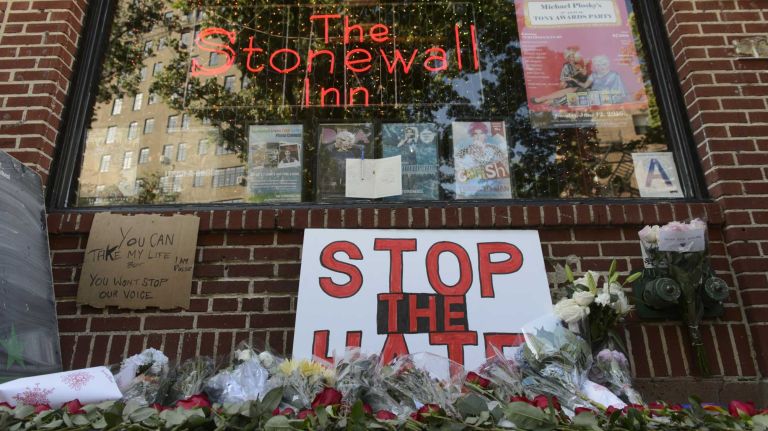
In the wake of Sunday’s massacre at a gay nightclub in Orlando by a gunman who claimed allegiance to the Islamic State, New Yorkers have taken to city streets and parks to memorialize the victims, many of whom were from the LGBT community.
There have been multiple vigils outside the Stonewall Inn, a monument of the gay pride movement — in addition to a ceremony at Bennett Park in Washington Heights.
One in particular, organized hours after the news broke, demonstrates NYC’s diversity, and “NYC at its best,” according to one attendee.
Coming together with broken hearts
Jackson Heights is the center of Queens’ gay community. It’s also is home to a large immigrant population, including a significant number of South Asian New Yorkers, many of whom are Muslims.
The neighborhood’s vigil at Diversity Plaza on Sunday night was particularly resonant.
The plaza, a section of 37th Road between 73rd and 74th Streets, serves as an events and gathering spot, according to Councilmember Daniel Dromm. Given its crossroads location within various immigrant communities, it has played host to disparate events, including Tibetan prayer ceremonies, Eid celebrations and tree lightings.
It also has been the scene of more somber occasions — vigils after terrorist attacks on Paris and San Bernardino and the earthquake in Nepal.
On Sunday, rainbow flags hung in windows, and flowers and lit candles were placed in the plaza by attendees. Signs decried both homophobia and Islamophobia.
Speakers included the city comptroller, public advocate and other politicians, but faith and community leaders also attended the event — Mohamed Amin, of the Caribbean Equality Project, an LGBT support network, and Agha Saleh of SUKHI NY, which participates in the operation of the plaza.
Brendan Fay, a founder of the St. Pat’s for All parade in Queens which until this year was the refuge for gay Irish marchers, said that Jackson Heights is a “second home” for those identifying as LGBT in the city, a neighborhood where they live “side by side” with Muslim New Yorkers. Fay noted the tragic timing of what should have been a celebratory moment for both communities, during Pride and Ramadan. Participants tried to remember some of that on Sunday.
Fay said the event “was as if the heart of New York was broken but then opened,” where New Yorkers “came together, hoped, embraced, held hands.”
Beyond vigils
Details hinting at the gunman’s motives and acts continue to emerge, with reports last night that he had been to the club multiple times and had used a gay dating app.
As the vigils come to an end for now, gathering and mourning seems to be the sum total of the national response.
The political battle lines do not appear to have shifted — in a speech Monday Donald Trump focused on a wide ban on immigration, though the Orlando gunman was an American citizen. And Hillary Clinton called for an assault weapons ban that continues to be unlikely in Congress.
In New York, Fay said there was much to do beyond vigils, at least in terms of cultural acceptance and the bigotry at the root of the massacre: “Immigrants, many people still do not feel free to come out. Religious and faith communities need to be more welcoming and affirming of the LGBT community.”
Affirmation was part of the focus of another march held in the Jackson Heights neighborhood Monday night — the fifth annual “Translatina March” organized by immigration nonprofit Make the Road New York, dedicated this year to the trans and general LGBT community and the many Hispanic victims in Orlando.
Natalia Aristizabal-Betancur, an organizer of the march, said that anti-LGBT animus was alive and well in New York. There were three incidents in Jackson Heights in the last three weeks, from homophobic slurs to actual attacks, including a stabbing and beating that were reported to the police, she said.
Aristizabal-Betancur said it is important not to lose sight that the gunman “was a homophobic, hateful man.”
This is amExpress, the conversation starter for New Yorkers. Subscribe at amny.com/amexpress.
































